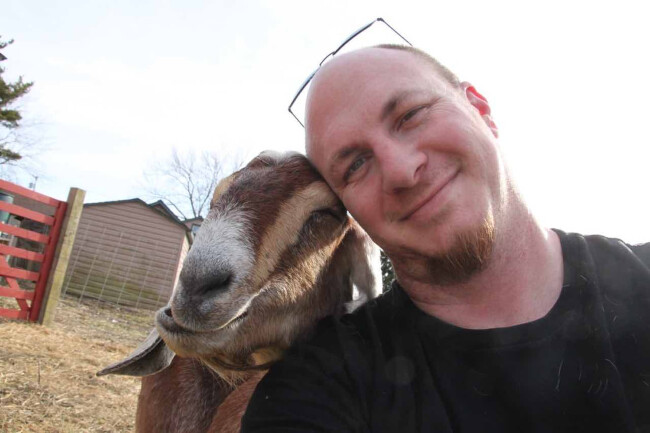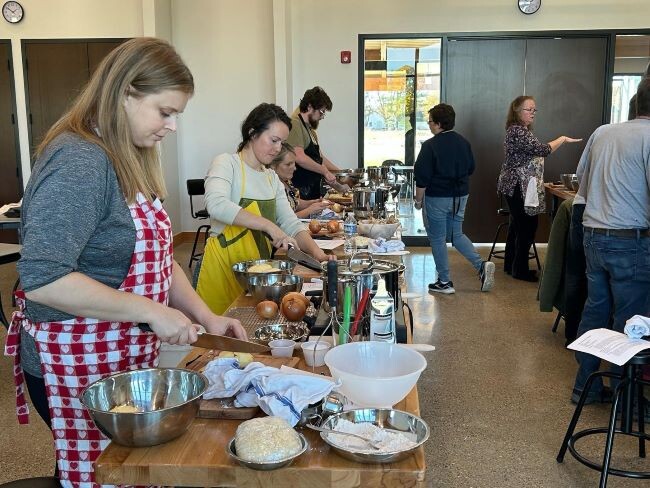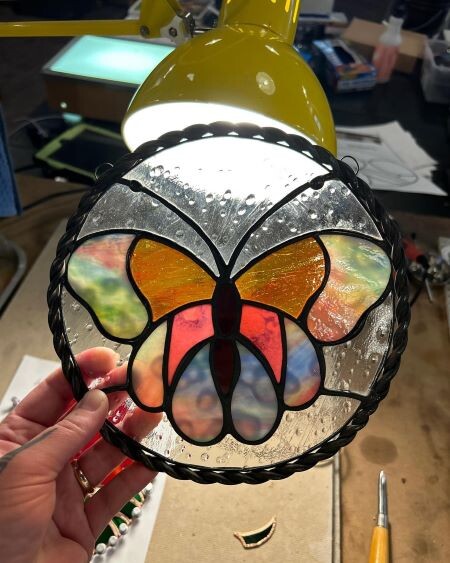Image


By Taiyler Stanfield, STN Writer
Nestled in the woods on Plymouth Road in Superior Township, the Michigan Folk School is just one of many folk schools around the country that has flourished over the past couple of years. But what exactly are folk schools?
“A folk school is a craft school where elements like blacksmithing, leatherworking, and gardening all take place,” Director of the Michigan Folk School Jason Gold explained. “While I say we’re a school, we’re also a community center.
A division of Washtenaw County Parks & Recreation, the Michigan Folk School has a campus comprised of multiple buildings of various sizes. Curious visitors thirsting for further knowledge of the old trades, the most popular of which are hands-on, can always find it ready.
 Director Jason Gold has been a part of the Michigan Folk School since its official opening in 2012 and is currently instructing woodworking, leatherworking, and broom making. Photo: www.mifolkschool.com
Director Jason Gold has been a part of the Michigan Folk School since its official opening in 2012 and is currently instructing woodworking, leatherworking, and broom making. Photo: www.mifolkschool.com“We have three areas that are the strongest with regard to the amount of people that are attracted. The first one is the leatherworking. The second area is blacksmithing, and the third is stained glass,” said Gold.
This year, the Michigan Folk School will host over 400 classes, and about 3,200 people will learn various crafts in the workshops throughout the year.
“Last year, we only did approximately 270 classes, which was much less than the 400 distributed this year,” Gold said. Courses include such skills as archery, baking, blacksmithing, ceramics, glass, printmaking, and woodworking among others.
“Folk schools are all over the world now. In the United States alone, we have about 150 folk schools, and some of them have been operating since the late 1800s,” explains Gold.
 Workshop where students learned to make homemade pierogis. Photo: Instagram
Workshop where students learned to make homemade pierogis. Photo: InstagramInvented in Northern Europe, folk schools became popular around the Industrial Revolution, which began in 1760 and ended in the mid-1800s.
“The Industrial Revolution was in full force at that time. And there was a group of people that were growing concerned that all this great technology that was making things so much faster meant that people were also losing the identity of being together. All of a sudden, now it's machinery,” explains Gold.
A strong parallel can be made today as technology continues to advance each year.
Gold continues, “We live in a very digital world today where everything is basically handheld on smartphones or computers. Even our cars are basically computers with four wheels. And so there is this movement, almost reminiscent of the Industrial Revolution that kind of freaked people out back in the 1800s about losing knowledge. I think that we're at the same threshold. We're worried about losing knowledge. We're worried about losing the ability to use our hands the way that we have.”
Gold observes that, although COVID-19 resulted in millions of lives being lost and was a struggle for many, it also opened up people’s views and interests after returning to the ‘norm’ after being stuck in their houses for the past couple of years because of the pandemic. Many turned to the folk school to regain the traditional sense of community again.
 Result of an intermediate stained-glass class. Photo: Instagram
Result of an intermediate stained-glass class. Photo: Instagram“Before COVID hit, our [students] were an average age of about 55 to 60, and they were predominantly female,” Gold says. “All of a sudden, the 55-year age went down drastically into the high 40s. And then it became almost an even split between male and female. We start seeing more younger people here who have day jobs in the tech world who are literally looking to get away from their screens and actually get into a physical product again.”
Besides the drastic change in male and female attendance at the Michigan Folk School, the number of folk schools in the country has also increased. Gold says that in 2012, there were probably about 90 Folk Schools in the U.S. compared to today’s 150.
Folk schools also differ from “regular” schools in the way they teach and educate those taking classes.
“A Folk School takes into consideration the education of what we would refer to as the ‘average folk’ or the ‘average person,’ and it is a way of preserving knowledge and creating a community forum,” says Gold.
In the end, folk schools not only open your eyes to the world of crafting with your hands but also to the people in the schools who will give you a sense of community.
Gold encourages exploration of the old arts, saying, “Handcrafting is truly a magical world. You can get lost in it. You can have a very cathartic experience. It's used in therapy and many models. But at the end of the day, this is a craft school that also absolutely embraces and loves the concept of community.”
For more information about the Michigan Folk School, go to https://www.mifolkschool.com/ where you can also register for classes.